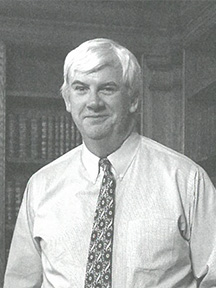By Madeline Vuong
Who’s the best public speaker at Williams College? It’s a contentious question, but regardless of whom you ask, Professor Steven Fix’s name is likely to be in the mix.
Among his colleagues, he is known for timing his lectures down to the second— literally. He once told a beginning English professor, “That was an excellent lecture, but you’re running twenty-three seconds too long.” Among his students, Fix is known for delivering such moving lectures as to reduce students to tears, even when those lectures concern 18th century authors like Samuel Johnson—one of his personal favorites.
Besides his speaking engagements in the English department, Fix is also the college’s Phi Beta Kappa Chapter Historian, and it falls to him to deliver the history of the Society at Williams each year, on the day before graduation. So, on June 7, 2014, Professor Fix delivered a rousing rendition of the history of Phi Beta Kappa, much to the delight of the audience who, having been awakened for the 8:30 a.m. event, needed some rousing.
“The history of Phi Beta Kappa at Williams is a history filled with jealousy, intrigue, suspicion, and, alternately, triumph!” Fix began, intoning dramatically. The audience laughed along with him, but as his speech continued, it became clear that the history of Phi Beta Kappa at Williams actually was filled with all of those things and more, focused centrally around an educational rivalry between the two oldest colleges in Massachusetts—Harvard and Williams.
According to Fix, Phi Beta Kappa was originally a fraternity. “Unfortunately, Williams College banned fraternities years ago, so as members of Phi Beta Kappa, you’re all expelled,” he said. “That’s it. Congratulations. This ought to significantly shorten tomorrow’s ceremony…”
In all seriousness, though, Phi Beta Kappa was originally formed as a secret society at William and Mary, and it had all the attractions of one—rites of initiation, secret signs known only to members, and lots of swearing of oaths. Today, Phi Beta Kappa retains all of these features. However, the initiation is a public one, the sign of membership is the well-known key, and there is but one oath of loyalty, not to a fraternity, but to philosophy—to the love learning and wisdom. Clearly, the mission of Phi Beta Kappa has changed drastically since its inception. “So I suppose you’re all safe,” Fix said.
“At any rate, William and Mary, as the original location of Phi Beta Kappa, was vested with the power to establish new chapters, and the college chose to bestow chapters upon Harvard and Yale, along with the power to approve or veto new charters for schools in their respective states,” Fix said. And that’s where the drama really took off and how it came to be that despite being the second-oldest college in Massachusetts, Williams was the 17th chapter of Phi Beta Kappa to be established.
“Now why would that be?” Fix asked. “Well, we would have had a chapter earlier, but for the jealousy of Harvard…” According to Fix, Harvard was worried about bequests—essentially, about who would get the money left to the state for education. In a successful bid to delay the founding of Williams College, Harvard’s board of overseers wrote to the colonial government, “It cannot be thought that the means of education at another college will be near as good as at our college…”
And so it was that Williams’ founding was delayed until 1792, when the trustees of Williams College struck back at the overseers of Harvard. The Williams trustees petitioned the colonial government for a charter on the grounds that Williamstown, being an “enclosed place,” would not expose students to the kind of “temptations and allurements peculiar to seaport towns [e.g. Boston].” Williamstown was cast as an institution that would civilize the frontier and turn out moral citizens—something that held great weight for a government that was terrified by the news of rebel uprisings, as in the French Revolution and Shay’s Rebellion.
Perhaps unsurprisingly, the relationship between Williams and Harvard remained prickly after Williams obtained its school charter. Recall now that Harvard controlled which Massachusetts colleges could have Phi Beta Kappa chapters, so in order to found a chapter at Williams College, Williams had to send Harvard an application. Harvard responded predictably—issuing a pocket veto, refusing to vote one way or another, and thereby leaving Williams to wait indefinitely.
Eventually, though, in 1833, the stalemate was broken. Williams’ then-president, Ed Griffin told two students to go over the New York-Massachusetts border to Union College [in Albany, NY] to ask them for a charter instead. Union College replied that they didn’t have the authority to establish a chapter of Phi Beta Kappa outside of their own state, but they could issue other charters, so the Williams students came home with a charter to start a fraternity called “Kappa Alpha.” “The president saw ‘Kappa’ on a piece of paper and heartily congratulated the students on their success,” Fix reported.
But inevitably, the difference was realized, and in 1861, Williams tried again to found a chapter of Phi Beta Kappa, reopening negotiations with Harvard. Finally, Harvard relented. “And as the Civil War raged, a society founded in the Revolutionary War had its inauguration at Williams College,” said Fix.
Today, only one remnant of this dramatic power struggle between Harvard and Williams over Phi Beta Kappa remains. It is on the founding document for Williams’ chapter, where the words, “Harvard University,” the chapter-granting authority, appear fourteen times larger than “Williams College.”
“So remember that Williams College struggled to have a chapter of Phi Beta Kappa, and honor that struggle by taking seriously your commitment to a lifelong love of philosophy,” Fix said, finishing at exactly twenty minutes, on the dot, to resounding applause.
Madeline Vuong is recent graduate of Williams College in English and Women’s, Gender, and Sexuality Studies. She became a member of Phi Beta Kappa in junior year. Williams College is home to the Gamma of Massachusetts Chapter of Phi Beta Kappa.




